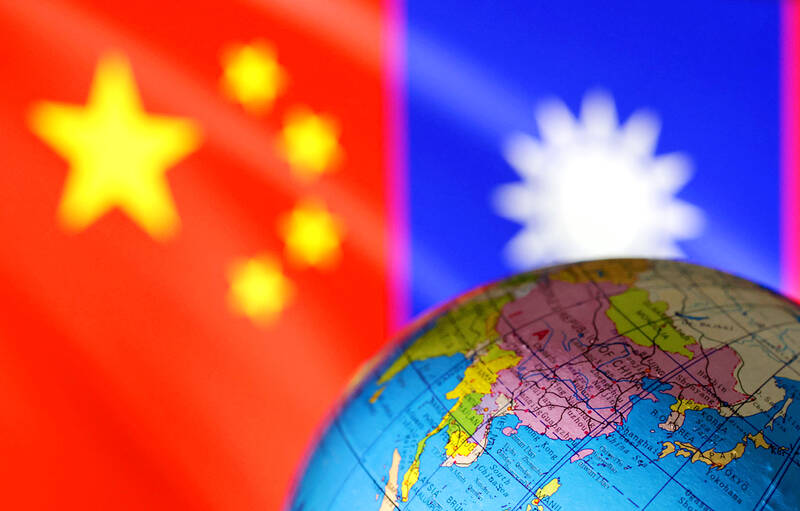The EU should impose financial sanctions that go “hard, fast and where it hurts” on China if a Taiwan crisis occurs, as “gradual sanctions escalation could be counterproductive,” a European Council on Foreign Relations (ECFR) policy brief published earlier this month said.
The pan-European think tank brief, published on Sept. 19 and written by senior policy fellow Agathe Demarais, aimed to draw insights from Western sanctions on Russia after its invasion of Ukraine and proposed sanctions deterrence against China in cross-strait conflict scenarios.
The EU’s threat of sanctions against China could be “game-changing” as Beijing, like Moscow, would think it improbable for 27 EU member states to unite on sanctions, Demarais wrote.

Photo: Reuters
Although China might threaten to retaliate against EU sanctions, “clear threats from the bloc would signal to Beijing that the costs of an aggression are even higher than those that the Chinese leadership already expects,” and Russia’s experience would prompt China to “think twice before brushing off Europe’s warnings,” she said.
However, traditional financial sanctions might not work as “China has spent years insulating itself from financial sanctions through ‘de-dollarization,’ ‘de-SWIFTing’ and the development of digital currencies,” she said.
By 2028, “threats of measures targeting China’s access to Western financial channels or currencies would be unlikely to alter Beijing’s calculus around Taiwan, as Chinese leaders are making fast progress toward financial self-sufficiency,” Demarais said.
“This means that Europe’s strongest leverage probably lies in trade measures targeting China’s access to the EU market,” she said.
China’s economic growth relies on exports of manufactured goods and that reliance “may well be its Achilles’ heel,” she said.
“Exports account for nearly 20 percent of China’s GDP, with nearly 40 percent of these going to G7-EU economies,” while 100 million jobs in China depend on foreign demand, including at least 45 million from G7-EU economies, she said.
The EU and its G7 partners should institute sanctions targeting imports of noncritical, finished consumer goods, particularly electronics and low-end goods, which accounted for 13 percent and 9 percent respectively of total Chinese exports, she said.
“A drop in the supply of these goods would be manageable for Western consumers, at least for a while. But for China, joint G7-EU measures curbing the shipments of these products would be hugely painful,” Demarais said.
“This means that if deterrence fails and EU policymakers choose to impose sanctions on China, then they should go hard and fast,” she said.
Gradual sanctions escalation would risk “supporting Chinese efforts to build long-term immunity to financial sanctions,” and would make it unlikely that the EU and its allies could “engineer a balance-of-payments crisis in China through a seizure of the country’s central bank reserves,” she said.
“European policymakers need to start discussing potential Taiwan-related triggers for sanctions on Beijing and map out the consequences of a drastic reduction in trade relations with China,” she said.
The EU would have to “think of financial compensation packages for those EU firms that will be most affected by sanctions and seriously beef up its ability to tackle sanctions disinformation,” she added.

An essay competition jointly organized by a local writing society and a publisher affiliated with the Chinese Communist Party (CCP) might have contravened the Act Governing Relations Between the People of the Taiwan Area and the Mainland Area (臺灣地區與大陸地區人民關係條例), the Mainland Affairs Council (MAC) said on Thursday. “In this case, the partner organization is clearly an agency under the CCP’s Fujian Provincial Committee,” MAC Deputy Minister and spokesperson Liang Wen-chieh (梁文傑) said at a news briefing in Taipei. “It also involves bringing Taiwanese students to China with all-expenses-paid arrangements to attend award ceremonies and camps,” Liang said. Those two “characteristics” are typically sufficient

A magnitude 5.9 earthquake that struck about 33km off the coast of Hualien City was the "main shock" in a series of quakes in the area, with aftershocks expected over the next three days, the Central Weather Administration (CWA) said yesterday. Prior to the magnitude 5.9 quake shaking most of Taiwan at 6:53pm yesterday, six other earthquakes stronger than a magnitude of 4, starting with a magnitude 5.5 quake at 6:09pm, occurred in the area. CWA Seismological Center Director Wu Chien-fu (吳健富) confirmed that the quakes were all part of the same series and that the magnitude 5.5 temblor was

The brilliant blue waters, thick foliage and bucolic atmosphere on this seemingly idyllic archipelago deep in the Pacific Ocean belie the key role it now plays in a titanic geopolitical struggle. Palau is again on the front line as China, and the US and its allies prepare their forces in an intensifying contest for control over the Asia-Pacific region. The democratic nation of just 17,000 people hosts US-controlled airstrips and soon-to-be-completed radar installations that the US military describes as “critical” to monitoring vast swathes of water and airspace. It is also a key piece of the second island chain, a string of

The Central Weather Administration has issued a heat alert for southeastern Taiwan, warning of temperatures as high as 36°C today, while alerting some coastal areas of strong winds later in the day. Kaohsiung’s Neimen District (內門) and Pingtung County’s Neipu Township (內埔) are under an orange heat alert, which warns of temperatures as high as 36°C for three consecutive days, the CWA said, citing southwest winds. The heat would also extend to Tainan’s Nansi (楠西) and Yujing (玉井) districts, as well as Pingtung’s Gaoshu (高樹), Yanpu (鹽埔) and Majia (瑪家) townships, it said, forecasting highs of up to 36°C in those areas